
All categories
Featured selections
Trade Assurance
Buyer Central
Help Center
Get the app
Become a supplier

(4673 products available)



















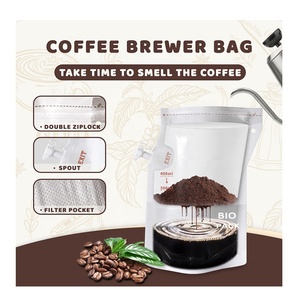



















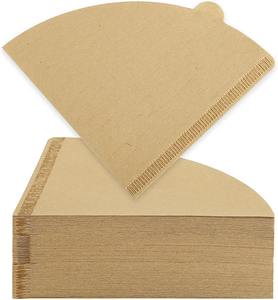
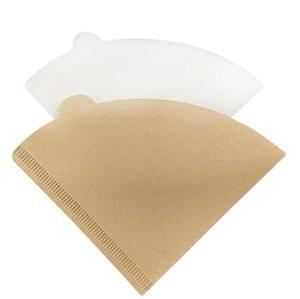
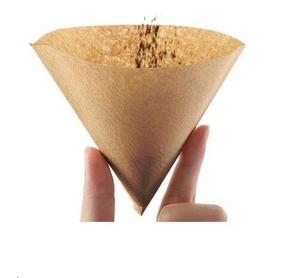
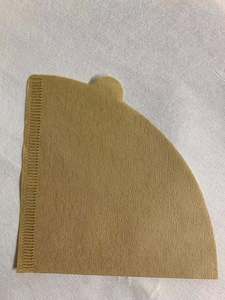
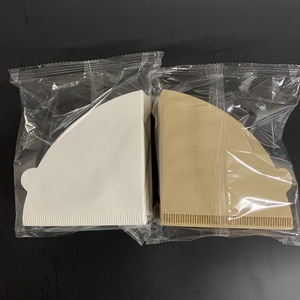
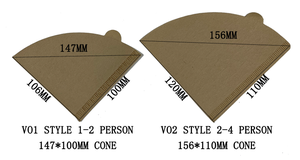






A cone coffee filter is a tool for brewing coffee. It holds coffee grounds and lets water through to extract flavor. There are different kinds of cone coffee filters. Each kind has its advantages:
Cone coffee filters are designed to fit into cone-shaped coffee makers. They come in different shapes, materials, and sizes, each with unique properties that affect the taste and quality of brewed coffee. Below are some key design aspects of cone coffee filters.
Shape:
The shape of cone coffee filters is designed to fit into a cone-shaped receptacle. This allows for an efficient brewing process, where hot water passes through coffee grounds and filters into the container below. The conical shape enables even saturation of coffee grounds by water, resulting in uniform extraction. Different sizes are available, such as 1, 2, and 4, which correspond to different-sized coffee makers.
Material:
Paper filters are usually made from high-quality pulp paper that is treated through a process called fiber bleaching to remove natural oils and improve permeability. This results in a cleaner flavor profile since it removes fine coffee particles and oils. The materials used for metal filters include stainless steel, aluminum, or copper. These materials are strong, durable, and resistant to rusting or corrosion. They can withstand high temperatures and pressure without losing their structural integrity, making them ideal for brewing coffee.
Texture:
Paper filters have a smooth texture that helps catch all the coffee grounds, preventing them from entering the brewed coffee. Metal filters have a mesh-like texture with fine openings, allowing some coffee oils and microgrounds to pass through, adding to the flavor and body of the coffee.
Color:
Paper filters are available in white or brown colors. The white filters go through a bleaching process to remove the brown color of the pulp. Brown filters are unbleached, retaining more of the natural fiber content, which gives a brownish tint.
Fold design:
Many cone coffee filters have a pleated or folded design, which allows the filter to expand as water is poured into it. This pleating increases the surface area of the filter in contact with water, promoting better extraction of flavors from the coffee grounds.
Cone coffee filters are used in various settings to improve the taste and quality of brewed coffee. Some common usage scenarios include:
Overall, cone coffee filters are used in many scenarios where clean and flavorful coffee is desired, making them an essential accessory for coffee lovers.
When choosing cone coffee filters, the following aspects should be considered.
Brewing Method
Different brewing methods require different types of filters. For example, paper filters are often used in pour-over methods to trap coffee grounds in cone-shaped drippers, while metal mesh filters may be used in others. Choose a filter that suits the desired brewing method.
Taste Preference
The type of filter can affect the taste of the brewed coffee. Paper filters trap fine particles, resulting in a clean cup, while metal mesh filters allow some oils and sediments through for a fuller body. Consider the taste profile and texture preference when selecting a filter.
Convenience
Consider the ease of use and cleaning. Paper filters are disposable and require no cleaning, while metal mesh filters need to be cleaned and reused. If convenience is a priority, a disposable filter may be better.
Size and Compatibility
Make sure the filter size matches the coffee maker or brewing device. Filters come in various sizes, so selecting one that fits properly is important. Some coffee makers may require specific filter shapes or sizes, so checking compatibility is essential.
Material Quality
Choose high-quality materials for filters. Paper filters should be chlorine-free and safe for the environment. Metal mesh filters should be made from stainless steel or other rust-resistant materials.
Environmental Considerations
If users are concerned about environmental impact, consider using reusable filters, such as metal mesh filters or coffee sock filters, instead of disposable paper filters.
Q1: What are the sizes of cone coffee filters?
A1: Cone coffee filters are available in various sizes, including 1, 2, and 4. The size one filter is suitable for small single-cup brewers. Size two filters fit medium brewers, while size four filters are used for large brewers. They differ in diameter and depth to match different coffee makers.
Q2: What is the difference between paper and metal cone coffee filters?
A2: Paper cone coffee filters effectively remove fine coffee grounds and oils, resulting in a clean cup of coffee. They are disposable and come in various papers. Metal cone filters, like stainless steel, allow some oils and fines through, giving a fuller-bodied coffee. Metal filters are reusable, making them more eco-friendly and cost-effective over time.
Q3: Can cone coffee filters be used in different coffee makers?
A3: Cone coffee filters are designed for specific coffee makers. It is essential to check compatibility before use. Different coffee makers require different sizes and shapes of filters. Using the wrong filter can affect brewing efficiency and coffee taste.
Q4: Do cone coffee filters make a difference in coffee taste?
A4: Yes, cone coffee filters can affect coffee flavor. They trap coffee grounds and sediments, giving a clean taste. Paper filters create a light, crisp flavor by removing oils and fines. Metal filters allow oils to pass through, giving a richer, fuller taste.
Q5: Are disposable cone coffee filters better than reusable ones?
A5: Disposable filters are convenient and ensure a clean taste each time. They are better for those who want a quick, hassle-free option. Reusable filters are eco-friendly and cost-effective in the long run. They are suitable for those who want to reduce waste and save money.